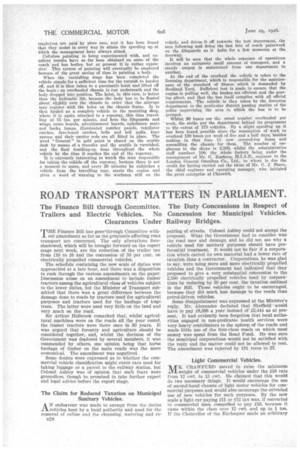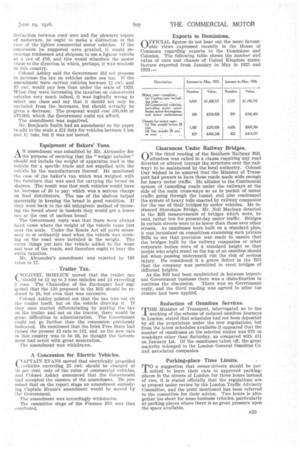ROAD TRANSPORT MATTERS IN PARLIAMENT.
Page 12

Page 13

If you've noticed an error in this article please click here to report it so we can fix it.
The Finance Bill through Committee. The Duty Concessions in Respect of Trailers and Electric Vehicles. No Concession for Municipal Vehicles. Clearances Under Railway Bridges.
rrl HE Finance Bill has gone'through Committee with1 out amendment so far as the proposals affecting road transport are concerned. The only alterations foreshadowed, which will be brought forward on the report stage next week, are the reduction of the trailer tax from £10 to £6 and the concession of 50 per cent, on electrically propelled commercial vehicles.
The schedule containing the new scale of duties was approachtd at a late hour, and there was a disposition to rush through the various amendments on the paper. Discussion arose on an amendment to include timber tractors among the agricultural class of vehicles subject to the lower duties, but the Minister of Transport submitted that there was a great difference between the damage done to roads by tractors used for agricultural purposes and tractors used for the haulage of huge trees. The latter were used very little on the land and very much on the road.
Sir Arthur Holbrook remarked that, whilst agricultural machines were on the roads all the year round, the timber tractors were there once in 30 years. It was argued that forestry and agriculture should be considered together,. and, whilst the decision of the Government was deplored by several members, it was commended by others, one opinion being that horse haulage of timber on the main roads was the more economical. The amendment was negatived. Some doubts were expressed as to whether the commercial vehicle classification might cover cars used for taking luggage or a parcel to the railway station, but Colonel Ashley was of opinion that such fears were groundless, though he promised to take further expert and legal advice before the report stage.
The Claim for Reduced Taxation on Municipal Sanitary Vehicles.
AN endeavour wasmade to exempt from the duties vehicles kept by a local authority and used for the removal of refuse and the cleansing, watering and ren28
pairing of streets. Colonel Ashley could not accept the proposal. What the Government had to consider was the road user and damage, and he did not see why a vehicle used for sanitary purposes should have preferential treatment. It would not be fair if a corporation which carted its own material had a lower rate of taxation than a contractor. Corporations, he was glad to say, were using more and more electrically propelled vehicles and the Government had indicated that they proposed to give a very substantial concession to the 2,500 electrically propelled vehicles used by corporations by reducing by 50 per cent. the taxation outlined in the Bill. Those vehicles ought to be encouraged, because they did much less damage to the roads than petrol-driven vehicles. Some disappointment was expressed at the Minister's reply. Mr. Alexander declared that Sheffield 'would have to pay £8,388 a year instead of £2,444 as at present. It had evidently been forgotten that local authorities engaged in non-profitable health services were very heavy contributors to the upkeep of the roads and made little use of the first-class roads on which most money was spent from the Road Fund. He was sure the municipal corporations would not be satisfied with the reply and the matter could not be allowed to rest. The amendment was rejected by 131 votes to 27.
Light Commercial Vehicles.
MR. CRAWFURD moved to raise the minimum weight of commercial vehicles under the £10 rate from 12 cwt. to 15 cwt. He claimed that this would do two necessary things. It would encourage the use of second-hand chassis of light motor vehicles for commercial purposes and would also encourage the extended use of new vehicles for such purposes. By the new scale a light car paying 111 or £12 tax was, if converted to commercial uses, compelled to pay /16. because it came within the class over 12 ewt. and up to 1 ton. If the Chancellor of the Exchequer made an arbitrary
distinction between road user and the pleasure aspect of motorcars, he ought to make a distinction in the case of the lighter commercial motor vehicles. If the concession he suggested were granted, it would encourage tradesmen and shoprnen to use a lighter vehicle at a tax of £10, and this would stimulate the motor trade in the direction in which, perhaps, it was weakest in this country.
Colonel Ashley said the Government did not propose to increase the tax on vehicles under one ton. If the amendment were carried vehicles between 12 cwt. and 15 cwt. would pay less than under the scale of 1920. When they were increasing the taxation on commercial vehicles very much indeed, it was logically wrong to select one class and say that it should not only be excluded from the increases, but should actually be given a decrease. The proposal would cost £60,000 or £70,000, which the Government could not afford.
The amendment was negatived.
Mr. Benjamin Smith had an amendment on the paper to add to the scale a £21 duty for vehicles between 1 ton and 11. tons, but it was not moved.
Equipment of Bakers' Vans.
A N amendment was submitted by Mr. Alexander for _tithe purpose of securing that the "weight unladen" should not include the weight of apparatus used in the vehicle for a specific trade and not supplied with the vehicle by the manufacturers thereof. He mentioned the case of the baker's van which was weighed with the furniture that was used for carrying the bread on shelves. The result was that such vehicles would have an increase of 1,6 to pay, which was a serious charge on food distributors. The use of the shelves helped materially in keeping the bread in good condition. If they went back to the old unhygienic method of throwing the bread about in baskets they would get a lower tax at the cost of unclean bread
The Government reply was that there were always hard cases where the weight of the vehicle came just over the scale. Under the Roads Act all parts necessary to or ordinarily used when the vehicle was working on the road were included in the weight. The extra things put into the vehicle added to the wear and tear of the roads, and therefore ought to bear the extra taxation.
Mr. Alexander's amendment was rejected by 136 votes to 17.
Trailer Tax.
COLONEL FIORLICK moved that the trailer tax should be £2up to 2 tons unladen and £4 exceeding 2 tons, The Chancellor of the Exchequer had suggested that the £10 proposed in the Bill should be reduced to £6, but even that was excessive.
Colonel Ashley pointed out that the tax was not on the trailer itself, but on the vehicle drawing it. If they once started differentiating by putting the tax on the trailer and not on the tractor, there would be great difficulties in administration. The Government could not go farther than the concession previously indicated. He mentioned that the Irish Free State had raised the present £2 rate to £12, and as the new rate in this country was to be £6, he thought the Government had acted with great moderation.
The amendment was withdrawn.
A Concession for Electric Vehicles.
CAPTAIN EVANS moved that electrically propelled vehicles exceeding 25 cwt. should be charged at 50 per cent. only of the rates of commercial vehicles, and Colonel Ashley announced that the Government had accepted the essence of the amendment. He promised that on the report stage an amendment embodying Captain Evans'samendment would be moved by the Government.
The amendment was accordingly withdrawn.
The committee stage of the Finance Bill was then concluded.
Exports to Dominions.
OFFICIAL figures do not bear out the more favourable views expressed recently in the House of Commons regarding exports to the Dominions and Colonies. The following table shows the number and value of cars and chassis of United Kingdom manufacture exported from January to May in 1925 and 1926:—
Clearances Under Railway Bridges.
()N the third reading of the Southern Railway Bill, attention was called to a clause requiring any road diverted or altered (except the structure over the railway) to be maintained by the local authority. Colonel Day wished to be assured that the Minister of Transport had powers to have these roads made wide enough for heavy motor traffic. He alluded to the Continental system of tunnelling roads under the railways at the side of the main cross-ways so as to permit of motor traffic going through the tunnel, and also condemned the system of heavy tolls enacted by railway companies for the use of their bridges by motor vehicles. He instanced Shoreham Bridge. Mr. Neil Maclean detected in the Bill measurements of bridges which were, he said, rather low for present-day motor traffic. Bridges in certain streets were to be lower than those over)other streets. As omnibuses were built on a standard plan, it was incumbent on committees examining such private Bills to see that provision was made to ensure that the bridges built by the railway companies or other corporate bodies were of a standard height so that people who might stand on the top of an omnibus should not when passing underneath run the risk of serious injury. He considered it a grave defect in the Bill that the company was permitted to erect bridges of different heights.
As the Bill had been sandwiched in between important Government business there was a disinclination to continue the discussion. There was no Government reply, and the third reading was agreed to after the closure had been applied.
Reduction of Omnibus Services.
rrIHE Minister of Transport, interrogated as to the 1 working of the scheme of reduced omnibus journeys in London, stated that schedules had not been deposited by all the proprietors under the new regulations, but from the latest schedules available it appeared that the number of omnibuses on the selected routes was 373 on weekdays other than Saturday, as compared with 411 on January 1st. Of the omnibuses taken off, the great majority belonged to the London General Omnibus Co. and associated companies.
Parking-place Time Limits.
TO a suggestion that owner-drivers should be permilted to leave their cars in approved parkingplaces in the streets of London for three hours instead of two, it is stated officially that the regulations are at present under review by the London Traffic Advisory Committee, and the point mentioned has been referred to the committee for their advice. Two hours is altogether too short for some business vehicles, particularly at parking places where there is no great pressure upon the space available.




























